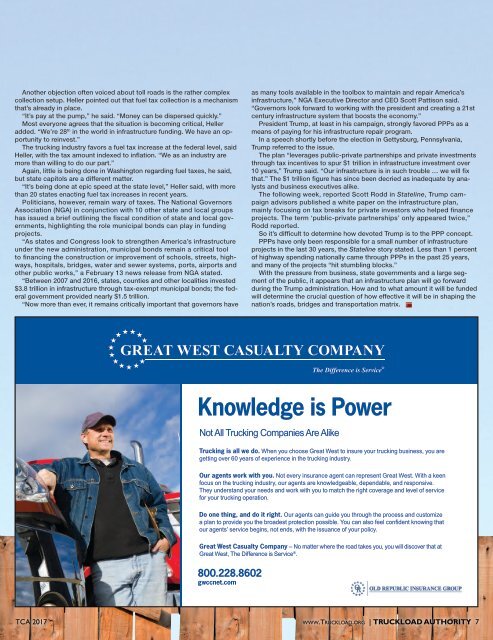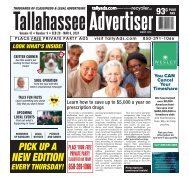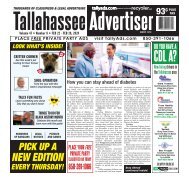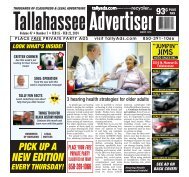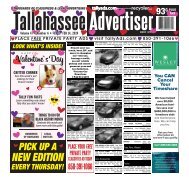TLA23_AllPages_R
You also want an ePaper? Increase the reach of your titles
YUMPU automatically turns print PDFs into web optimized ePapers that Google loves.
Another objection often voiced about toll roads is the rather complex<br />
collection setup. Heller pointed out that fuel tax collection is a mechanism<br />
that’s already in place.<br />
“It’s pay at the pump,” he said. “Money can be dispersed quickly.”<br />
Most everyone agrees that the situation is becoming critical, Heller<br />
added. “We’re 28 th in the world in infrastructure funding. We have an opportunity<br />
to reinvest.”<br />
The trucking industry favors a fuel tax increase at the federal level, said<br />
Heller, with the tax amount indexed to inflation. “We as an industry are<br />
more than willing to do our part.”<br />
Again, little is being done in Washington regarding fuel taxes, he said,<br />
but state capitols are a different matter.<br />
“It’s being done at epic speed at the state level,” Heller said, with more<br />
than 20 states enacting fuel tax increases in recent years.<br />
Politicians, however, remain wary of taxes. The National Governors<br />
Association (NGA) in conjunction with 10 other state and local groups<br />
has issued a brief outlining the fiscal condition of state and local governments,<br />
highlighting the role municipal bonds can play in funding<br />
projects.<br />
“As states and Congress look to strengthen America’s infrastructure<br />
under the new administration, municipal bonds remain a critical tool<br />
to financing the construction or improvement of schools, streets, highways,<br />
hospitals, bridges, water and sewer systems, ports, airports and<br />
other public works,” a February 13 news release from NGA stated.<br />
“Between 2007 and 2016, states, counties and other localities invested<br />
$3.8 trillion in infrastructure through tax-exempt municipal bonds; the federal<br />
government provided nearly $1.5 trillion.<br />
“Now more than ever, it remains critically important that governors have<br />
as many tools available in the toolbox to maintain and repair America’s<br />
infrastructure,” NGA Executive Director and CEO Scott Pattison said.<br />
“Governors look forward to working with the president and creating a 21st<br />
century infrastructure system that boosts the economy.”<br />
President Trump, at least in his campaign, strongly favored PPPs as a<br />
means of paying for his infrastructure repair program.<br />
In a speech shortly before the election in Gettysburg, Pennsylvania,<br />
Trump referred to the issue.<br />
The plan “leverages public-private partnerships and private investments<br />
through tax incentives to spur $1 trillion in infrastructure investment over<br />
10 years,” Trump said. “Our infrastructure is in such trouble … we will fix<br />
that.” The $1 trillion figure has since been decried as inadequate by analysts<br />
and business executives alike.<br />
The following week, reported Scott Rodd in Stateline, Trump campaign<br />
advisors published a white paper on the infrastructure plan,<br />
mainly focusing on tax breaks for private investors who helped finance<br />
projects. The term ‘public-private partnerships’ only appeared twice,”<br />
Rodd reported.<br />
So it’s difficult to determine how devoted Trump is to the PPP concept.<br />
PPPs have only been responsible for a small number of infrastructure<br />
projects in the last 30 years, the Stateline story stated. Less than 1 percent<br />
of highway spending nationally came through PPPs in the past 25 years,<br />
and many of the projects “hit stumbling blocks.”<br />
With the pressure from business, state governments and a large segment<br />
of the public, it appears that an infrastructure plan will go forward<br />
during the Trump administration. How and to what amount it will be funded<br />
will determine the crucial question of how effective it will be in shaping the<br />
nation’s roads, bridges and transportation matrix.<br />
Knowledge is Power<br />
Not All Trucking Companies Are Alike<br />
Trucking is all we do. When you choose Great West to insure your trucking business, you are<br />
getting over 60 years of experience in the trucking industry.<br />
Our agents work with you. Not every insurance agent can represent Great West. With a keen<br />
focus on the trucking industry, our agents are knowledgeable, dependable, and responsive.<br />
They understand your needs and work with you to match the right coverage and level of service<br />
for your trucking operation.<br />
Do one thing, and do it right. Our agents can guide you through the process and customize<br />
<br />
our agents’ service begins, not ends, with the issuance of your policy.<br />
Great West Casualty Company – No matter where the road takes you, you will discover that at<br />
Great West, The Difference is Service ® .<br />
800.228.8602<br />
gwccnet.com<br />
TCA 2017 www.Truckload.org | Truckload Authority


